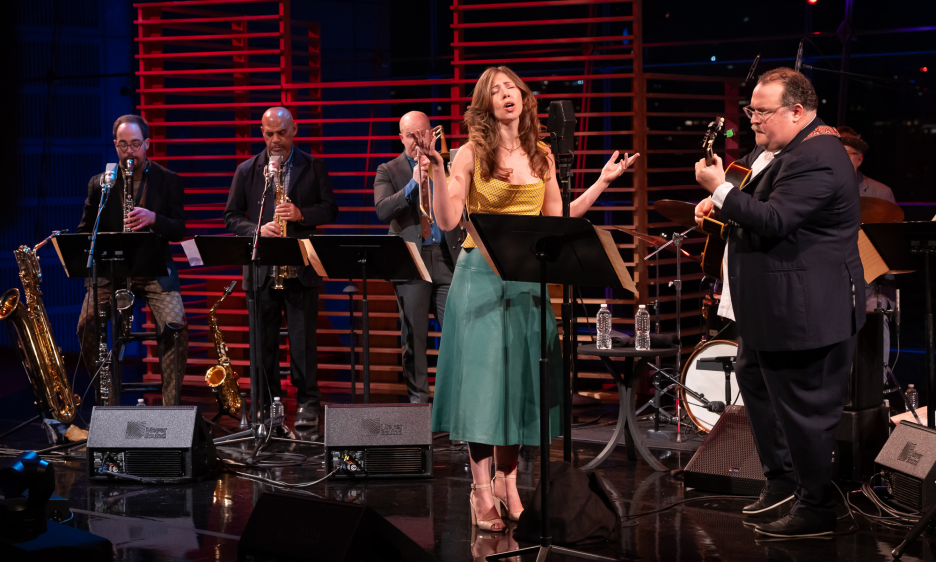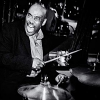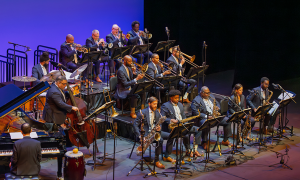Home » Jazz Articles » Live Review » The Unity Festival at Jazz at Lincoln Center
The Unity Festival at Jazz at Lincoln Center

Courtesy Gilberto Tadday
Even committed attendees of New York's Winter JazzFest—held at the same time—should consider heading uptown for a day or two to enjoy this satisfying and intimate affair.
Jazz at Lincoln Center
Unity Festival
New York, NY
January 11, 2025
In its second year, the Unity Festival at Jazz at Lincoln Center—audaciously counter-programmed against the NYC Winter JazzFest—again presented a diverse two-day program, this time including tributes to two fallen jazz giants.
The Unity event—befitting its Upper West Side location—is less artistically edgy than its downtown rival. It's also (literally) a warmer experience, with its performances held at four indoor spaces within JALC's Columbus Circle headquarters, rather than at Village and Brooklyn venues separated by chilly walks.
The headliners for both days of the festival were the swing-jazz traditionalists Rachael and Vilray, who performed twice: as a duo Friday night and backed by a sextet on Saturday. The duo's appeal begins with their fine voices—Rachael Price's sultry soprano and Vilray's crooning tenor—and continues with them eschewing the camp theatricality of other swing revivalists. The two are all about the music; no beret or gardenia adorned Price's head and not a word of hipsterism marred the between-song banter.
Rachael and Vilray's biggest distinction is their repertoire, which is almost entirely written by Vilray, who has a knack for creating originals that are stylistically in sync with the '30s and '40s and yet sound fresh. On Saturday's show, the duo used fine sidemen to further hew to swing style. There was ample clarinet playing from the three-man horns-and-reeds section, which included Steve Wilson on saxophones, and occasional zingy xylophone-sounding vibes from Warren Wolf, who also doubled ably on piano.
Saturday's special event—following a Sun Ra tribute on Friday, led by Sullivan Fortner—was an all-star concert in honor of drummer Roy Haynes, who died in November at age 99. Helmed by Haynes' grandson drummer, Marcus Gilmore, the rotating lineup featured further family participation through Roy's sons, trumpeter Graham Haynes and drummer Craig Haynes. After relatively restrained drumming from Gilmore, it was Craig Haynes whose playing most evoked the power and authority (if not the finesse) of his father, who was always a formidable and muscular presence on the bandstand.
The set's MVPs were Kenny Barron and Dave Holland, who on several numbers together exuded their customary elegance and yen for finishing each other's musical thoughts, as in solos that transitioned from one of them to the other with an echo of the last few bars of the other's just-ended excursion. Altoist Jaleel Shaw, a member of the last Roy Haynes Quartet, was an assertive standout, too, in pieces that ranged stylistically from bebop ("Segment," which Haynes played with Charlie Parker) through "Miss Ann," which the drummer recorded in 1960 with Charlie Parker—and which featured superb and occasionally explosive drumming from Terri Lyne Carrington.
The wild card—and the only performer to speak about Haynes from the stage—was an effervescent Dee Dee Bridgewater, who reminisced about sharing a love for cowboy boots with the late drummer before what was likely the first performance of a Kenny Rogers song at The House That Jazz Built. Bridgewater sang a jazzified version of "The Gambler," whose folksy, iconic chorus she said Haynes would invariably recite whenever the two met.
Bookending the night were fine big bands led by women composers, each showcasing new works. Canada's Christine Jensen—whose 19-piece ensemble included her trumpeter sister Ingrid Jensen, presented sprawling and impressionistic compositions, mostly from her 2024 album Harbour. Working with a band that was smaller and swung more than Jensen's, Helen Sung previewed Portraits In Jazz, her upcoming album that pays tribute to mentors and inspirations. The tributes often honored her heroes less by aping their musical styles than through showcasing the instruments they played—a spotlight on soprano sax for her Wayne Shorter tribute, for example, and solos from the entire trumpet section in the nod to Clark Terry).
A good festival should surprise you with artists you would have barely heard of and quickly adore. The freshness of a set by The Westerlies in Unity's acoustic studio began with the group's unique instrumental lineup—two trumpets and two trombones—and playing that was both precise and full of warmth. Then came a repertoire that ranged from Ellingtonia, with the Duke's horn voicings expertly rendered, through a gorgeous version of John Prine's "Way Back When" to a searching version of traditional English folk ballad "Pretty Saro." The Westerlies' music is unique, beautifully rendered, and ripe for discovery by more listeners who have big ears.
The same might be said of the Unity Festival. The event embraces a wider musical palette than that of JALC's resident jazz orchestra, presenting consistently solid, and sometimes outstanding, acts, all of which fit comfortably under the big tent of jazz. Even committed attendees of the Winter JazzFest should consider heading uptown for a day or two to enjoy this satisfying and intimate affair.
Tags
Live Review
Rachael and Vilray
Paul Reynolds
United States
New York
New York City
Jazz at Lincoln Center
winter jazzfest
Rachael Price
Vilray
Steve Wilson
Warren Wolf
Sun Ra
Sullivan Fortner
Roy Haynes
Graham Haynes
Craig Haynes
Kenny Barron
Dave Holland
Charlie Parker
Eric Dolphy
Terri Lyne Carrington
Dee Dee Bridgewater
Kenny Rogers
Christine Jensen
Ingrid Jensen
Harbour
Helen Sung
Wayne Shorter
Clark Terry
The Westerlies
John Prine
Unity Festival
Marcus Gilmore
About Rachael and Vilray
Instrument: Band / ensemble / orchestra
PREVIOUS / NEXT
Support All About Jazz
 All About Jazz has been a pillar of jazz since 1995, championing it as an art form and, more importantly, supporting the musicians who make it. Our enduring commitment has made "AAJ" one of the most culturally important websites of its kind, read by hundreds of thousands of fans, musicians and industry figures every month.
All About Jazz has been a pillar of jazz since 1995, championing it as an art form and, more importantly, supporting the musicians who make it. Our enduring commitment has made "AAJ" one of the most culturally important websites of its kind, read by hundreds of thousands of fans, musicians and industry figures every month.



























